Fair Trade
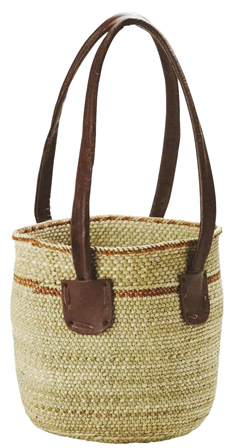
The Capacious Iringa Basket Bag makes market day a pleasure. Woven from milulu grass, a reed-like swamp grass, Iringa baskets are an indispensable utility item in East Africa and around the world. Kwanza (which means “first” in Swahili) exports the handicrafts of 800 batik artisans, potters, woodcarvers and artisans making musical instruments and textiles in Dar es Salaam, Zanzibar, and other areas of the country. Ten Thousand Villages has purchased products from Tanzania through Kwanza Collections and other suppliers based in Tanzania since 1998. Kwanza Collections was formed in 2001 as the marketing arm of Amka Registered Trustees, to export the handicrafts of rural artisans and small-scale producer groups working with Amka. Amka, which means “to awaken” in Swahili, was formed in 1994 with the support of Overseas Development Assistance (ODA) and funded by the British government.
- Made of Kitenge cloth, reeds, leather
- Zippered inner pocket
- 9” diameter x 9” high
- $59.00
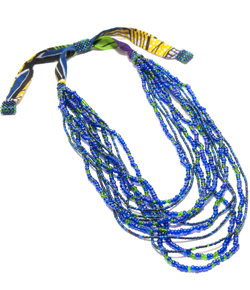
This necklace is perfectly paired with workplace attire or a casual weekend look. The beadwork is carefully constructed by Maasai women in Tanzania and the colorful cloth closure adds a pop of color and a stylish detail. Maasai Women’s Development Organization (MWEDO) works with the semi-nomadic Maasai of Tanzania, boosting development through the production and sale of traditional beaded ornaments, jewelry, and home accents. Founded in 2000, MWEDO provides human rights education, adult literacy, girls’ education, and health services. It trains women in leadership and business skills as well as craft development. MWEDO encourages the formation of women’s cooperatives and provides training, materials, and marketing assistance that contribute to the success of income-generating operations.
- Seed bead, cloth and leather
- Hangs 13″
- Available in Black & White or Blue
- $37.50
Books
Fiction
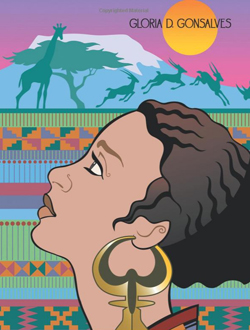
The Wisdom Huntress: Anthology of Thoughts and Narrations
By Gloria D. Gonsalves (AuthorHouseUK, 2012)
In this book are narrations and personal thoughts by Savanna, a woman who sees herself as a huntress for wisdom from the knowledge-filled expanses of her vast life in the worldly plains. Her exclusive records cover a range of subjects from love to death, food to music, which harmoniously form this book. This book is aimed at provoking minds to question and subsequently try to understand the acts and thoughts of human beings regardless of their origin and culture. The proverbs are meant to help one connect them to the stories told. The book also provides an opportunity to introduce the African proverbs and Khanga sayings, to those not acquainted with them. Further it offers a means of preserving African literary riches that at times are passed on orally by those who practice them. Above all this book is dear to the author as it enabled her to kick off her humanitarian related aspiration. Gloria D. Gonsalves is from Korogwe, Tanzania, where she lived for 27 years before migrating to Europe for further studies. Her aspiration is to see her books available worldwide as well as raise funds to support humanitarian related projects.
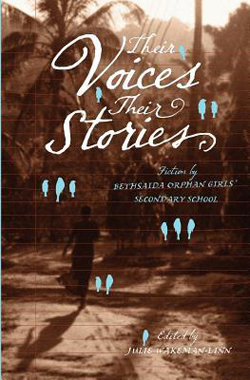
Their Voices, Their Stories. Fiction by Bethsaida Orphan Girls’ Secondary School
By Julie Wakeman Linn (Mkuki Na Nyota Publishers, 2011)
This book features short stories by thirteen students and has the dual purpose of being a fundraiser for the school and giving the girls a voice. It is a unique and enthralling work of fiction. The stories ranges from magical realism to fable, from historical fiction to bildungsroman (novel dealing with personal growth). Under the professional and passionate editorial guidance of Maryland professor Julie Wakeman-Linn, this collection sings of the fears, anxieties and dreams of young Tanzanian women, who pray their education will be the golden ticket out of lives filled with poverty and abuse. UNICEF estimates that Tanzania has over 3 million orphans. The Bethsaida Orphan Girls Secondary School seeks to help the most vulnerable of Tanzania’s children. Founded by Mrs. Anna Machary in 2005 under the auspices of the non-governmental organization, the Olof Palme Orphans Education Center, the school currently enrolls over 130 orphan girls from all over the country, providing them with free housing, meals, psychological support and a quality secondary education.
Non-Fiction
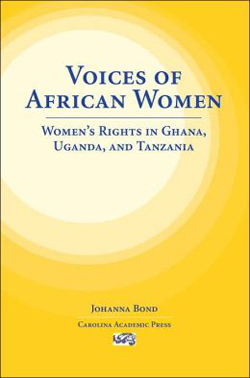
Voices of African Women: Women’s Rights In Ghana, Uganda, And Tanzania
By Johanna Bond (Carolina Academic Press, 2005)
Voices of African Women is a collection of essays by accomplished women’s rights lawyers from Ghana, Uganda, and Tanzania. In the last decade, women’s human rights have been the focus of significant attention at the international level. There remains, however, a dearth of information concerning the application and relevance of international norms at grassroots levels within Africa.
There are few works about women’s human rights within Africa that are actually written by African women lawyers and human rights activists. This book offers a glimpse into the lives of women in Ghana, Uganda, and Tanzania; it describes – in their own words – the challenges these activists face in implementing international human rights norms at the local and national levels.
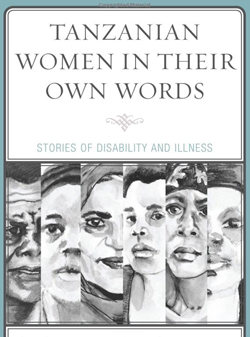
Tanzanian Women in Their Own Words: Stories of Disability and Illness
By Sheryl Feinstein, Nicole C. D’Errico, and Nancy Scheper-Hughes (Lexington Books, 2010)
Beginning with their earliest childhood memories, the narrators weave their life stories through adulthood, telling of the hardships and support systems in their daily lives. A rich knowledge of Tanzanian culture is embedded in each story; the pivotal role tribal affiliation, polygamy, and poverty play in society is addressed. HIV/AIDS, cancer, polio, female genital mutilation, and tuberculosis are just a few of the health issues covered.
The authors make a concerted effort to include the major medical challenges facing this developing country, including an interview with an albino woman that introduces the little discussed atrocity of albinos being murdered for body parts to be used in ritual medicine practices. In spite of the abuse and exclusion many of the women suffer, eventually each learns to live in harmony with her reality. This makes their lives inspiring and gives perspective to those facing physical challenges.
Tanzanian Women in Their Own Words encourages readers to consider issues of health care, transportation, ignorance, polygamy, gender discrimination, and rural isolation. Through learning about the health challenges faced by Tanzanian women, we are introduced to the life-ways and concerns of Tanzanian culture, the challenges faced by many developing countries, and the intimate and evocative level of detail that can only be discovered through intensive ethnographic fieldwork.
Films
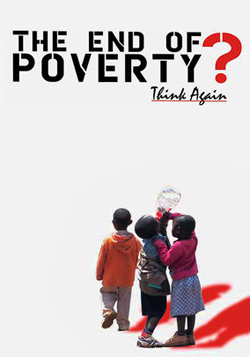
The End of Poverty (2009, 105 minutes)
Global poverty did not just happen. It began with military conquest, slavery and colonization that resulted in the seizure of land, minerals, and forced labor. Today, the problem persists because of unfair debt, trade and tax policies – in other words, wealthy countries taking advantage of poor, developing countries. Renowned actor and activist, Martin Sheen, narrates The End of Poverty, a feature-length documentary directed by award-winning director, Philippe Diaz, which explains how today’s financial crisis is a direct consequence of these unchallenged policies that have lasted centuries.
Consider that 20 percent of the planet’s population uses 80 percent of its resources and consumes 30 percent more than the planet can regenerate. At this rate, to maintain our lifestyle means more and more people will sink below the poverty line.
Filmed in the slums of Africa and the barrios of Latin America, The End of Poverty features expert insights from Nobel Prize winners in Economics Amartya Sen and Joseph Stiglitz; acclaimed authors Susan George, Eric Toussaint, John Perkins, Chalmers Johnson; university professors William Easterly and Michael Watts; government ministers such as Bolivia’s Vice President Alvaro Garcia Linera and the leaders of social movements in Brazil, Venezuela, Kenya and Tanzania. It is produced by Cinema Libre Studio in collaboration with the Robert Schalkenbach Foundation. Can we really end poverty within our current economic system? Think again.
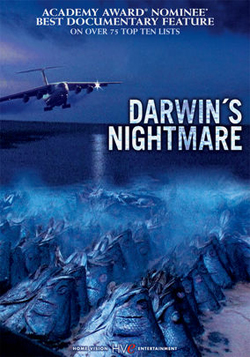
Darwin’s Nightmare (2004, 107 Minutes)
Forty years ago, a voracious predator was introduced into the waters of Tanzania’s Lake Victoria where it quickly extinguished the entire stock of native fish. Its ecological impact aside, the Nile Perch became highly prized for its tender, plump fillets, hardly meeting the demand at elegant 4-star European restaurants. Huge, empty foreign cargo planes land to export the lake’s gourmet bounty, taking out 55 tons of processed fish daily. In their wake, they leave starving villagers to scrounge a meal out of the discarded fish heads and rotting carcasses. With massive epidemics, raging civil wars, crime, homelessness, and drug-addicted children, the question becomes: what do the reportedly “empty” planes deliver to this destitute community? The answer is as shocking as it is devastating, and Darwin’s Nightmare becomes a nightmare for all mankind.
Darwin’s Nightmare is a 2004 French‐Belgian‐Austrian documentary film about the environmental and social effects of the fishing industry around Lake Victoria in Tanzania. It premiered at the 2004 Venice Film Festival, and was nominated for the 2006 Academy Award for Documentary Feature at the 78th Academy Awards.
Also available on Netflix
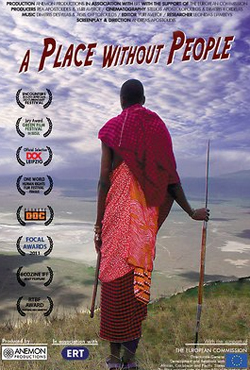
A Place Without People (2009, 55 minutes)
A Place without People tells the story of the eviction of the indigenous people from their lands in Tanzania to clear space for the creation of the world’s most famous nature reserves. In Tanzania, one of the world’s poorest nations, the government, tourist industry, and conservation organizations have advanced the idea that Africans are intruders into what was once a pristine Garden of Eden.
The film describes how prior to World War II, the land of the Maasai was seized by British colonialists to set aside for their own sport-hunting. But as game grew scarce in the 1950s and ’60s, the British began to prioritize preservation and turned the Serengeti into a vast national park. Although there was no evidence that local people threatened wildlife, it was decreed that “no men, not even native ones, should live inside its borders.”
The film explores how Western perceptions about nature have evolved through time and how these perceptions radically altered this East African landscape and the culture of its natives. From the famous wildlife reserves of the Serengeti and the Ngorongoro to the remote mountains of Mahale, the documentary gives voice to the indigenous people who continue to be antagonized and excluded as the tourist industry rapidly depletes the area’s water and other natural resources.
Watch trailer on YouTube
Music
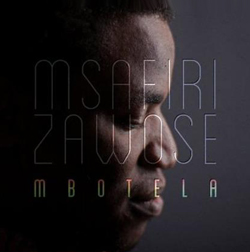
Msafiri Zawose – Mbotela
Msafiri Zawose has established himself within Tanzania as a positive musical force, preserving tradition, but with a modern twist. He has been able to maintain close ties to his roots and the traditional Gogo rhythms that give the music its unique sound, while creating an energy that is contagious to anyone who hears it.
While artists in Tanzania are adopting international styles such as hip-hop, Bongo Flava and reggae, Msafiri has built a sound that no one has been able to mimic. Singing in both Swahili and his native Gogo language, the music is truly based in the environment and the people that shaped its authors, who hope to share their experiences with their fello Tanzanians and the world.For those who can’t understand either language, the passion and energy are enough.
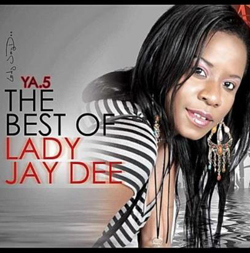
Judith Daines Wambura Mbibo, known as Lady Jay Dee, is an R&B/Hip-hop singer from Tanzania. She was voted Best Tanzanian Female R&B Artist in 2002, and was awarded “Best R&B Album” at the Tanzania Music Awards in 2004. She was among the first females to sing R&B in Swahili, and won the “best female video award” for South Africa.
In addition to using Swahili as the primary language in her music, Jay Dee has songs that incorporate English, French, Lingala, and Zulu.
She blends rich, soulful African vocals with arrangements and instrumentation blending both African traditional and modern influences.
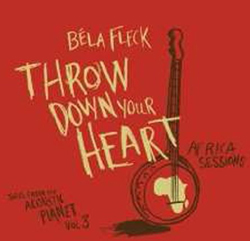
Throw Down Your Heart, Tales from the Acoustic Planet, Vol. 3: Africa Sessions
Throw Down Your Heart chronicles banjo virtuoso and 18 time Grammy award winner Bela Fleck’s musical journey to Africa to explore the African roots of the banjo. Bela’s boundary-breaking musical adventure takes him to Uganda, Tanzania, The Gambia, and Mali, and provides a glimpse of the beauty and complexity of African music. Using his banjo, Bela transcends barriers of language and culture, finding common ground and forging connections with musicians from very different backgrounds. Throw Down Your Heart is also the title of the award-winning documentary film about Bela’s journey to Africa.
Fair Trade, Books, and Film recommended by Marcie Christensen
Music recommended by Tanzania Nursing Scholarship Program
Dining for Women is a participant in the Amazon Services LLC Associates Program, an affiliate advertising program designed to provide a means for sites to earn advertising fees by advertising and linking to amazon.com.
